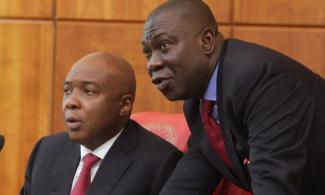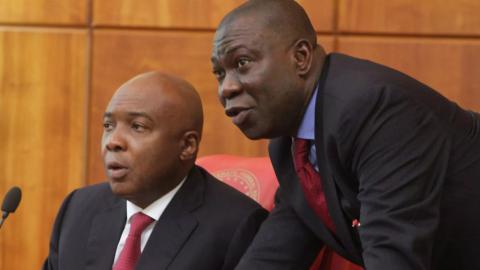
Messrs. Saraki and Ekweremadu, alongside the former Clerk to the National Assembly, Salisu Maikasuwa and his deputy, Benedict Efeturi, are accused of forging the Senate Standing Rules with which the upper chamber’s presiding officers were elected last year.
The Federal Government will rely on the testimony of 15 witnesses, among them Senators and National Assembly bureaucrats, at the trial of the President of the Senate, Bukola Saraki, his deputy, Ike Ekweremadu and other alleged conspirators over the ongoing case of alleged forgery.
Messrs. Saraki and Ekweremadu, alongside the former Clerk to the National Assembly, Salisu Maikasuwa and his deputy, Benedict Efeturi, are accused of forging the Senate Standing Rules with which the upper chamber’s presiding officers were elected last year.
The four accused persons were on June 27 arraigned before Justice Haliru Yusuf of the Federal Capital Territory High Court, Jabi, on a two-count charge of conspiracy and forgery, contrary to Sections 97 and 362 of the Penal Code Law respectively.
They were however granted bail before the court adjourned its proceedings to July 12.
Prosecution’s case against Saraki and his alleged conspirators
According to court documents obtained by PREMIUM TIMES, “it is the prosecution’s case against the defendants that sometimes about the 9th day of June, 2015, the defendants conspired among themselves to forge and indeed actually forged the Senate Standing Order 2011 (as amended) and caused the said forged document to be circulated among elected senators for use during the inauguration of the 8thSenate of the National Assembly of the Federal Republic of Nigeria.”
The document – prosecution’s case summary – was signed by a Principal State Counsel, D.E Kaswe on behalf of the Minister of Justice and Attorney-General of the Federation, Abubakar Malami, and is among documents filed before the Abuja High Court.
“It is the forged document that was used in the inauguration of the 8th National Assembly which paved the way for the election that ushered in the present leadership of the Senate,” added the document.
Lawyers in the case told PREMIUM TIMES that the government planned to prove its case by tendering the 2011 and 2015 rules before the court before then proceeding to call 14 witnesses who statements had already been filed.
Below are the fourteen witnesses to be called and what they will tell the court.
Fourteen witnesses and what they will tell the court
1. Suleiman Hukunyi – He is the secretary of the Unity Forum, the Senate caucus consisting of All Progressives Congress lawmakers who opposed the election of Mr. Saraki, preferring Ahmed Lawan instead. Days after the election of Messrs Saraki and Ekweremadu as the Senate presiding officers, he petitioned the Inspector General of Police, demanding criminal investigation into the allegation of forgery of Senate Rules. The main thrust of the petition which would later land Mr. Saraki and his alleged conspirators in trouble was that the Standing Rules used for 2015 inauguration “purports to allow for secret instead of the open ballot system that has been prevalent in all Senate elections as permitted by the extant rules.” The infraction, he told the Police, arose from the “fraudulent production of rules without an approved consideration by the 7th Senate.”
Mr. Hukunyi, according prosecution’s documents, including proof of evidence filed before the court, will testify how the “forged” Rules were distributed to the Senators and also “tender some exhibits.”
2. Ita Enang – Now presidential senior assistant on Senate matters, he was in the 7thSenate, representing Akwa Ibom North, and serving as the Chairman of the Rules and Business. In January, he was accused of complicity in the “missing” 2016 budget during the budget impasse. Specifically, he was accused of “doctoring” the budget proposal which had earlier been presented by President Muhammadu Buhari. Contacted in the wake of the allegation by PREMIUM TIMES, he said he was between “my two bosses,” preferring not to refute or admit the charge.
In the forgery suit brought against the Senate leaders, he “will tell the court the position of the Senate Standing Order 2011 vis a vis purported Standing Order 2015.” Further, the Federal Government will rely on him to testify that the “proposal for the amendment of the 2011 Senate Standing Order was neither considered nor adopted.”
3. Solomon Ewuga – He was a member of the 7thSenate. He did not return to the 8th Senate, having pursued a failed governorship ambition in Nasarawa State. He is expected to “tell the court what he knows of the Senate Standing Order 2011” and “shall testify that the 7th Senate did not amend the 2011 Senate Standing Order.
4. Ogozy Nma – A National Assembly bureaucrat who is the Secretary Committee on Rules and Business. The Rules and Business Committee is regarded as the “life wire” of the legislature as it is responsible for scheduling of legislative businesses, including amendment of rules. By virtue of Mr. Nma’s schedules, the Federal Government wants him to tell the court “what he knows of the forged Senate Standing Order.” He might be required to tender some exhibits in court.
5. Daniel Adem – He is the Secretary of the Directorate of Legal Services of the National Assembly. He will also tell the court what he knows of the Senate Standing Order.
6. Dan’Azumi Doma – He led the investigation of the alleged conspiracy and forgery as the Deputy Inspector General of Police in charge of CIID. He will tell the court how the case was investigated and the outcome of the investigation. In his report, he had said the Senate Rules were actually altered with valid procedures stipulated by the extant rules that are the 2011 Rules. He will most likely tender the police investigative report before the court.
7. Ahmed Lawan – He was supported by the APC leadership to contest the Senate leadership position against Mr. Saraki. He was defeated. And Mr. Saraki refused to appoint him Senate Leader as demanded by the leadership of the ruling APC. In his statement to the police, he said, “The procedures for election into the two presiding offices are clearly stipulated in Order 2 (2(i) of the Senate Standing Rules 2011. That contrary to the provision of the above order, the Clerk to the National Assembly introduced and used order 3(3) e (ii) of the purported 2015 Standing Order”. He will therefore inform the court “that the Senate Standing Order 2011 was never amended”.
8. Abdullahi Gumel – A serving Senator who supported Mr. Lawan’s ambition as member of the Unity Forum, will inform the court that he was given the 2011 Rules during the induction course of the 8th Assembly, yet a “forged” 2015 Rules was used for the inauguration of the 8thAssembly days after the induction course.
9. Kabiru Marafa – The Zamfara Central Senator is Mr. Saraki’s most outspoken and harshest critic in the Senate. On different occasions, he asked Mr. Saraki to resign to “save the image of the Senate” or that his colleagues should impeach him (Mr. Saraki) in view of the Senate President’s corruption trial at the Code of Conduct Tribunal. The Federal Government wants him to inform the court that the 2011 Rules were never amended to prove that the 2015 Rules were altered “without procedure.”
10. Gbenga Ashafa – The Lagos Senator will inform the 7th Senate did not amend the Rules, thereby stating that 2015 Rules used for election of Messrs Saraki and Ekweremadu was not valid, and as such the election was null and void.
11. Ajayi Boroffice – The Ondo Senator known as loyalist of former Lagos Governor Bola Tinubu will also inform the court that Senate Standing Order 2011 was never amended.
12. Abu Ibrahim – He was the Deputy Minority Whip in the 7th Senate. He will also inform the court the document was not amended. It should be noted that he was part of the leadership of the 7thSenate which, according to Mr. Efeturi, passed the order to “amend” the Senate Rules.
13. David Igbodo – He is an Assistant Commissioner of Police who was part of the investigation. He will also inform the court how the case was investigated and the outcome of the investigation.
14. Babafemi Ojudu – He is a presidential adviser on political matter and served in the 7th Senate, representing Ekiti Central. He will inform the court that the 7th Senate, of which he was member, did not amend the 2011 Rules.
